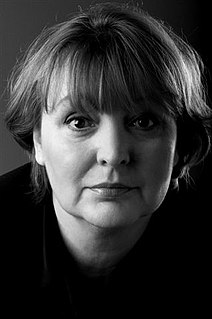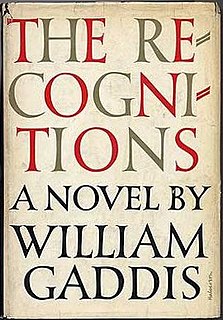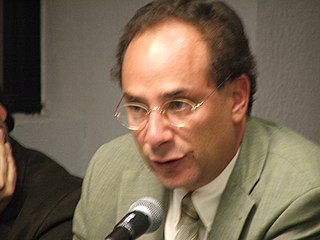Related Research Articles

Donald Richard DeLillo is an American novelist, short story writer, playwright, screenwriter and essayist. His works have covered subjects as diverse as television, nuclear war, sports, the complexities of language, performance art, the Cold War, mathematics, the advent of the digital age, politics, economics, and global terrorism.

Jorge Mario Pedro Vargas Llosa, 1st Marquis of Vargas Llosa, more commonly known as Mario Vargas Llosa, is a Peruvian novelist, journalist, essayist, and a former politician, who also holds Spanish citizenship. Vargas Llosa is one of Latin America's most significant novelists and essayists, and one of the leading writers of his generation. Some critics consider him to have had a larger international impact and worldwide audience than any other writer of the Latin American Boom. In 2010 he won the Nobel Prize in Literature, "for his cartography of structures of power and his trenchant images of the individual's resistance, revolt, and defeat." He also won the 1967 Rómulo Gallegos Prize, the 1986 Prince of Asturias Award, the 1994 Miguel de Cervantes Prize, the 1995 Jerusalem Prize, the 2012 Carlos Fuentes International Prize, and the 2018 Pablo Neruda Order of Artistic and Cultural Merit.

Anne Maeve Binchy Snell was an Irish novelist, playwright, short story writer, columnist, and speaker. Her novels were characterised by a sympathetic and often humorous portrayal of small-town life in Ireland, and surprise endings. Her novels, which were translated into 37 languages, sold more than 40 million copies worldwide, and her death at age 73, announced by Vincent Browne on Irish television late on 30 July 2012, was mourned as the death of one of Ireland's best-loved and most recognisable writers.

Marguerite Vivian Young was an American novelist and academic. She is best known for her novel Miss MacIntosh, My Darling. In her later years, she was known for teaching creative writing and as a mentor to young authors. "She was a respected literary figure as well as a cherished Greenwich Village eccentric." During her lifetime, Young wrote two books of poetry, two historical studies, one collection of short stories, one novel, and one collection of essays.

Brian O'Nolan, better known by his pen name Flann O'Brien, was an Irish civil service official, novelist, playwright and satirist, who is now considered a major figure in twentieth century Irish literature. Born in Strabane, County Tyrone, he is regarded as a key figure in modernist and postmodern literature. His English language novels, such as At Swim-Two-Birds and The Third Policeman, were written under the O’Brien pen name. His many satirical columns in The Irish Times and an Irish language novel An Béal Bocht were written under the name Myles na gCopaleen.

Sandra Cisneros is an American writer. She is best known for her first novel, The House on Mango Street (1983), and her subsequent short story collection, Woman Hollering Creek and Other Stories (1991). Her work experiments with literary forms that investigate emerging subject positions, which Cisneros herself attributes to growing up in a context of cultural hybridity and economic inequality that endowed her with unique stories to tell. She is the recipient of numerous awards, including a National Endowment for the Arts Fellowship, was awarded one of 25 new Ford Foundation Art of Change fellowships in 2017, and is regarded as a key figure in Chicano literature.

Dubravka Ugrešić is a Yugoslav and later Croatian writer. A graduate of University of Zagreb, she has been based in Amsterdam since 1996 and refuses to identify as a Croatian writer.
Cynthia Ozick is an American short story writer, novelist, and essayist.

The Recognitions is the 1955 debut novel of US author William Gaddis. The novel was initially poorly received by critics. After Gaddis won a National Book Award in 1975 for his second novel, J R, his first work gradually received new and belated recognition as a masterpiece of American literature.
Dermot Healy was an Irish novelist, playwright, poet and short story writer. A member of Aosdána, Healy was also part of its governing body, the Toscaireacht. Born in Finea, County Westmeath, he lived in County Sligo, and was described variously as a "master", a "Celtic Hemingway" and as "Ireland's finest living novelist".

Jorge Volpi is a Mexican novelist and essayist, best known for his novels such as In Search of Klingsor . Trained as a lawyer, he gained notice in the 1990s with his first publications and participation in the pronouncement of the "Crack Manifesto" with several other young writers to protest the state of Mexican literature and promote their own work. Volpi's novels are distinct from magical realism and other trends of Latin American literature as they focus on the actions of characters and research into academic topics, especially history and science, and do not always focus on Latin American characters and settings. His work has been translated into twenty five languages and recognized with awards such as Biblioteca Breva Award and the Planta-Casa de América as well as a grant from the Guggenheim Foundation. In addition to his writing he has worked as a cultural attaché, the director of Canal 22 in the State of Mexico and is currently the director of the Festival Internacional Cervantino.

Ignacio Padilla was a Mexican writer whose works were translated into several languages. Padilla helped found the Crack Movement, along with fellow writers Eloy Urroz, Jorge Volpi, and Pedro Angel Palou, as a means for Mexican authors to find their own voice and write beyond magic realism.
The Crack Movement, or literature of the Crack generation, describes a literary movement in Mexico that began in the mid-1990s. It was initiated by a number of young Mexican authors who broke with literary conventions in what is thought to have been a reaction to the Latin American Boom. Notable contributors include: Ignacio Padilla, Jorge Volpi, Eloy Urroz, Pedro Ángel Palou and Ricardo Chávez-Castañeda.
McOndo is a Latin American literary movement that breaks with the magical realism mode of narration, and counters it with languages borrowed from mass media. The literature of McOndo presents urban Latin American life, in opposition to the rural Latin America of Macondo.
Rikki Ducornet is an American writer, poet, and artist. Her work has been called “linguistically explosive and socially relevant,” and praised for “deploy[ing] tactics familiar to the historical avant-garde, including an emphasis on gnosticism, cosmology, diablerie, bestiary, eroticism, and revolution, to produce an astounding body of work, cogent and ethical in its beauty and spirit.”
Steven Moore is an American author and literary critic. Best known as an authority on the novels of William Gaddis, he is also the author of the two-volume study The Novel: An Alternative History.
Sarah Ladipo Manyika is a British-Nigerian writer of novels, short stories and essays. She is author of two well received novels, In Dependence (2009) and Like A Mule Bringing Ice Cream To The Sun (2016), and has had work published in publications including Granta, Transition, Guernica, and OZY, and previously served as founding Books Editor of OZY. Manyika's work also features in the 2019 anthology New Daughters of Africa.

Gabriel José de la Concordia García Márquez was a Colombian novelist, short-story writer, screenwriter, and journalist, known affectionately as Gabo or Gabito throughout Latin America. Considered one of the most significant authors of the 20th century, particularly in the Spanish language, he was awarded the 1972 Neustadt International Prize for Literature and the 1982 Nobel Prize in Literature. He pursued a self-directed education that resulted in leaving law school for a career in journalism. From early on he showed no inhibitions in his criticism of Colombian and foreign politics. In 1958, he married Mercedes Barcha Pardo; they had two sons, Rodrigo and Gonzalo.
The Review of Contemporary Fiction is a tri-quarterly journal published by Dalkey Archive Press. It features a variety of fiction, reviews and critical essays on literature that has an experimental, avant-garde or subversive bent. Founded in 1980 by the publisher John O'Brien, The Review of Contemporary Fiction originally focused upon American and British writers who had been overlooked by the critical establishment, and in this manner the Review succeeded in bringing new critical attention to writers such as William Gaddis, Gilbert Sorrentino, Paul Metcalf, Nicholas Mosley, Donald Barthelme, and many others. In 1984, in order to begin reprinting some of these authors, John O'Brien founded Dalkey Archive Press.
Warren F. Motte is a Professor of French and Comparative Literature at the University of Colorado Boulder. His focus is contemporary writing, with an emphasis upon experimental, avant-garde, or other subversive forms of both fiction and poetry. Motte has authored or edited many volumes of literary criticism, including the first book-length study of the renowned French writer Georges Perec, an authoritative book on the experimental writing group known as Oulipo, and major studies of other writers such as Edmond Jabès, Marie NDiaye, Christine Montalbetti, Antoine Volodine, and Jean Rolin. Motte's recent books include Mirror Gazing, a study of over 12,000 mirror scenes in literature, and French Fiction Today, devoted to the contemporary French novel. In 2015 Motte was named a Knight in the Ordre des Palmes Académiques by the French Republic. In 2016 he was named a College Professor of Distinction by the University of Colorado Boulder, and in 2018 he was named a Distinguished Professor, the highest honor the University of Colorado awards to its faculty members.
References
- ↑ "Dr. Eloy Urroz", The Citadel, retrieved 27 July 2016
- ↑ "Eloy Urroz", Dalkey Archive, retrieved 26 July 2016
- ↑ "The Crack-Up", The Nation, retrieved 26 July 2016
- ↑ "A Conversation With Eloy Urroz", Dalkey Archive Press, retrieved 26 July 2016
- ↑ "Review: The Family Interrupted", Library Journal, retrieved 26 July 2016
- ↑ "A Conversation With Eloy Urroz", Dalkey Archive Press, retrieved 26 July 2016